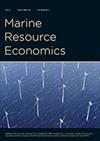Transition Patterns of Fishermen and Land Farmers into Small-Scale Seaweed Aquaculture: The Role of Risk and Time Preferences
IF 1.7
3区 经济学
Q2 ECONOMICS
引用次数: 2
Abstract
Seaweed harvest has denuded many areas of the sea floor, threatening marine ecosystems and the livelihood of coastal communities. Recently, small operators have begun to cultivate seaweed. This paper studies the role of fishing and agriculture, and their interactions with risk and time preferences, in the uptake of seaweed aquaculture. We use a Heckman selection model to study the decision to participate and expansion of production in seaweed aquaculture in Chile. We find that experience with seaweed farming, ecological benefits, and perception of well-suited areas increase participation in seaweed aquaculture. In addition, more contacts within the industry, a surveillance system against theft, and a shorter authorization period to farm increase seaweed production. Among land farmers, while more risk-tolerant producers participate more in seaweed aquaculture, more patient producers cultivate higher levels. We argue that policy design should consider the particularity of other sectors that are synergetic with aquaculture.渔民和土地农民向小规模海藻养殖的过渡模式:风险偏好和时间偏好的作用
海藻的收割使海底许多地区变得贫瘠,威胁到海洋生态系统和沿海社区的生计。最近,小型运营商开始种植海藻。本文研究了渔业和农业在海藻养殖中的作用,以及它们与风险和时间偏好的相互作用。我们使用赫克曼选择模型来研究智利参与和扩大海藻养殖生产的决定。我们发现,海藻养殖的经验、生态效益和对合适地区的认识增加了海藻养殖的参与度。此外,行业内更多的联系、防盗监控系统以及更短的养殖授权期增加了海藻产量。在土地农民中,虽然风险承受能力更强的生产者更多地参与海藻养殖,但更有耐心的生产者培养出更高水平的海藻。我们认为,政策设计应考虑到与水产养殖协同作用的其他部门的特殊性。
本文章由计算机程序翻译,如有差异,请以英文原文为准。
求助全文
约1分钟内获得全文
求助全文
来源期刊

Marine Resource Economics
农林科学-渔业
CiteScore
4.30
自引率
10.30%
发文量
25
审稿时长
>12 weeks
期刊介绍:
Marine Resource Economics (MRE) publishes creative and scholarly economic analyses of a range of issues related to natural resource use in the global marine environment. The scope of the journal includes conceptual and empirical investigations aimed at addressing real-world oceans and coastal policy problems. Examples include studies of fisheries, aquaculture, seafood marketing and trade, marine biodiversity, marine and coastal recreation, marine pollution, offshore oil and gas, seabed mining, renewable ocean energy sources, marine transportation, coastal land use and climate adaptation, and management of estuaries and watersheds.
 求助内容:
求助内容: 应助结果提醒方式:
应助结果提醒方式:


